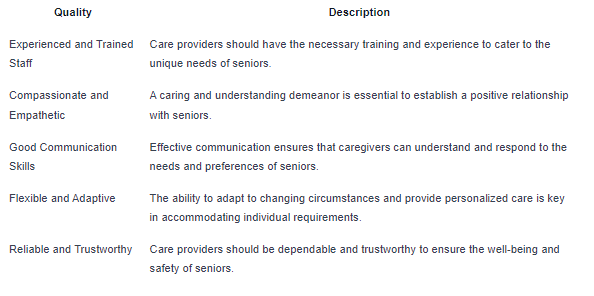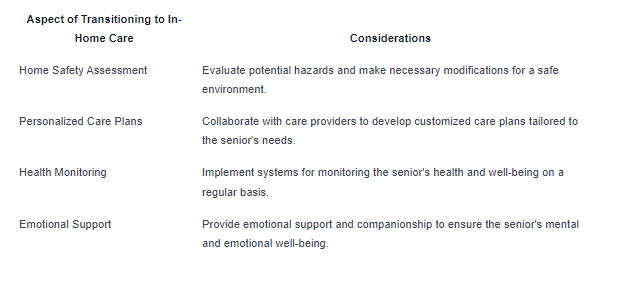Trusted In Home Care for Seniors & Quality Senior
March 4, 2025
Discover trusted in-home care for seniors. Quality solutions for secure and comfortable senior living.

Senior Living Solutions
When it comes to senior living solutions, understanding the significance of quality senior care and exploring in-home care options are paramount in ensuring the well-being and comfort of older adults.

Understanding the Importance of Quality Senior Care
Quality senior care plays a vital role in enhancing the quality of life for older individuals. It encompasses a range of services and support tailored to meet the unique needs of seniors, promoting their independence, health, and overall well-being.
A key aspect of quality senior care is ensuring that seniors receive personalized attention and assistance in daily activities. This not only addresses their physical and medical needs but also contributes to their emotional and social fulfillment. Quality senior care providers prioritize the dignity, respect, and safety of seniors, creating a nurturing and supportive environment for them to thrive.
Exploring In-Home Care Options
In-home care has emerged as a popular and preferred senior living option for many older adults who wish to age in place. This form of care allows seniors to receive personalized assistance and support in the comfort and familiarity of their own homes.
In-home care options typically include a range of services tailored to meet the individual needs of each senior. These services may include assistance with daily activities such as meal preparation, medication management, grooming, and mobility support. In-home care providers work closely with seniors and their families to develop customized care plans that address specific needs and preferences.
One of the key advantages of in-home care is the ability to maintain independence and autonomy while receiving necessary support. This type of care allows seniors to remain in a familiar environment, surrounded by their belongings and cherished memories, which can have a positive impact on their emotional well-being.
By understanding the importance of quality senior care and exploring the various in-home care options available, seniors and their families can make informed decisions that promote a safe, secure, and fulfilling living experience for older adults.
Benefits of In-Home Care
When considering in-home care for seniors, there are several valuable benefits that come with this type of care. These benefits include maintaining independence, personalized care plans, and the comfort of familiar surroundings.
Maintaining Independence
In-home care provides seniors with the opportunity to maintain their independence and autonomy. By receiving assistance in the comfort of their own homes, seniors can continue to engage in their daily routines and activities while receiving the necessary support they need. This sense of independence can lead to greater emotional well-being and a higher quality of life for seniors.
Personalized Care Plans
One of the key advantages of in-home care is the ability to receive personalized care plans tailored to the specific needs of each senior. Care providers work closely with seniors and their families to create individualized care plans that address both medical and non-medical needs. These customized care plans ensure that seniors receive the level of support that is right for them, promoting their overall well-being and quality of life.
Comfort of Familiar Surroundings
For many seniors, the familiarity and comfort of their own homes hold significant value. In-home care allows seniors to receive the care they need while remaining in an environment that is familiar and comforting to them. Being surrounded by personal belongings, memories, and a sense of independence can contribute to a greater sense of security and well-being for seniors receiving in-home care.
In addition to these benefits, in-home care offers seniors a sense of connection and continuity in their lives, promoting a holistic approach to senior care that encompasses both physical and emotional well-being. By choosing in-home care, seniors can enjoy the benefits of personalized support, independence, and the comfort of familiar surroundings, fostering a sense of security and well-being in their senior years.
Choosing Trusted Care Providers
When it comes to selecting care providers for seniors, there are certain qualities that individuals should consider to ensure their loved ones receive the best possible care. Additionally, understanding the licensing and accreditation of in-home care agencies is vital in guaranteeing the quality and reliability of the services provided.
Qualities to Look for in Care Providers
When choosing care providers for seniors, it's crucial to look for the following qualities:

Considering these qualities when selecting care providers can help families feel confident that their loved ones are in capable hands.
Licensing and Accreditation of In-Home Care Agencies
Ensuring that in-home care agencies are properly licensed and accredited is essential for maintaining high standards of care for seniors. Licensing and accreditation demonstrate that the agency meets specific criteria and regulations set by governing bodies, guaranteeing the quality and legality of the services provided.

By ensuring that in-home care agencies are licensed and accredited, families can have peace of mind knowing that their seniors are receiving care from reputable and trustworthy providers.
Quality of Life for Seniors
When it comes to senior living, quality of life is paramount. Ensuring seniors have access to services that promote physical well-being, enhance social engagement, and support emotional health is essential for their overall well-being and happiness.
Promoting Physical Well-Being
Promoting physical well-being among seniors is crucial for maintaining their independence and quality of life. In-home care services can play a significant role in supporting seniors' physical health through activities such as:

By incorporating these physical well-being strategies into seniors' daily routines, in-home care providers can help promote a healthier and more active lifestyle for older adults.
Enhancing Social Engagement
Social engagement is vital for seniors' mental and emotional well-being. In-home care services can facilitate social interactions and connections through activities such as:

By fostering social engagement, in-home care providers can help seniors combat feelings of isolation and loneliness, contributing to their overall happiness and quality of life.
Supporting Emotional Health
Supporting the emotional health of seniors is crucial for their overall well-being. In-home care services can offer emotional support and assistance through strategies such as:

By providing emotional support tailored to seniors' individual needs, in-home care providers can contribute to their emotional well-being and overall quality of life.
Prioritizing physical well-being, social engagement, and emotional support in senior living arrangements can significantly enhance the quality of life for older adults, ensuring they receive the care and support they need to thrive in their golden years.
Financial Considerations
When considering in-home care for seniors, it's vital to evaluate the financial aspects associated with the services. This section focuses on the cost of in-home care services, the coverage provided by Medicare and Medicaid, and planning for long-term care costs.
Cost of In-Home Care Services
The cost of in-home care services can vary depending on several factors such as the level of care needed, the location, and the specific services provided. Here is a general overview of the average costs for in-home care services in the United States:

It is essential to gather quotes from different agencies and providers to compare prices and services offered. Additionally, certain factors like the frequency of care, specialized medical needs, and additional support services can impact the overall cost.
Medicare and Medicaid Coverage
Medicare and Medicaid are two government programs that may provide coverage for certain in-home care services for eligible individuals:
- Medicare: Medicare typically covers short-term, medically necessary care provided by a home health agency. However, it does not cover long-term, custodial care.
- Medicaid: Medicaid offers more extensive coverage for in-home care services for low-income seniors who meet the eligibility criteria set by their state's Medicaid program.
It is important to consult with a Medicare or Medicaid representative to understand the specific services that may be covered and the eligibility requirements for each program.
Planning for Long-Term Care Costs
Planning for long-term care costs is crucial to ensure that seniors receive the necessary care without exhausting their financial resources. Long-term care insurance is one option to consider, as it can help cover expenses related to in-home care, assisted living, and nursing home care.
Here are some common strategies for planning for long-term care costs:
- Savings and Investments: Building a financial cushion specifically earmarked for long-term care needs can help alleviate the financial burden.
- Health Savings Accounts (HSAs): Contributions to HSAs can be used to pay for qualified medical expenses, including in-home care services.
- Consulting a Financial Advisor: Seeking guidance from a financial advisor can help develop a personalized financial plan tailored to long-term care needs.
By understanding the costs associated with in-home care services, exploring Medicare and Medicaid coverage options, and planning for long-term care expenses, families can make informed decisions about the financial aspects of senior care. It is advisable to start planning early to ensure a secure and stable financial future for your loved ones.
Planning Ahead
When it comes to ensuring quality senior living and trusted in-home care for seniors, planning ahead plays a crucial role in providing the necessary support and resources for a smooth transition. This section explores key aspects of long-term care planning, transitioning to in-home care, and strategies to ensure safe and secure senior living.
Long-Term Care Planning
Long-term care planning involves making decisions about the future care needs of seniors to ensure that they receive appropriate support as they age. It is essential to consider factors such as health conditions, financial resources, and personal preferences when creating a long-term care plan. By outlining specific care preferences and developing a comprehensive plan, seniors and their families can better prepare for future care needs.
Transitioning to In-Home Care
Transitioning to in-home care is a significant step for seniors who wish to maintain their independence while receiving the necessary assistance. This transition often involves assessing the home environment for safety, coordinating with care providers to establish personalized care plans, and implementing necessary modifications to support the senior's well-being at home. By carefully planning the transition to in-home care, seniors can continue to enjoy the comfort of familiar surroundings while receiving high-quality care.
Ensuring Safe and Secure Senior Living
Ensuring safe and secure senior living is paramount in providing a supportive environment for seniors receiving in-home care. This involves creating a safe living space by addressing potential hazards, installing safety features like grab bars and non-slip flooring, and implementing security measures to prevent accidents or emergencies. Additionally, caregivers should undergo training to handle medical emergencies and ensure the overall well-being of seniors in their care.
In the table below, let's highlight the key elements to consider when transitioning to in-home care:

As seniors plan ahead for their long-term care needs, transitioning to in-home care with a focus on safety and security is essential in promoting quality senior living. By addressing these key aspects proactively, seniors can age in place comfortably, maintain their independence, and receive the trusted care they deserve.
Sources
https://www.helpguide.org/aging/healthy-aging/home-care-services-for-seniors
https://seniorservicesofamerica.com/blog/how-to-find-home-care-for-seniors/
Similar articles

How Nursing Homes Handle Behavioral Challenges in Seniors

How to Prevent Setbacks After Short-Term Rehabilitation

The Role of Family Councils in Nursing Homes

How Nursing Homes Encourage Healthy Sleep Habits

How Post-Surgical Rehabilitation Helps Patients Recover Faster

The Role of Family in Supporting Therapy and Recovery in Long-Term Care
Contact us today and experience ”The Name in Healthcare”
Where compassion, well-being, and a welcoming community converge to redefine your healthcare journey. Welcome to Rosewood, where your family becomes our family.














